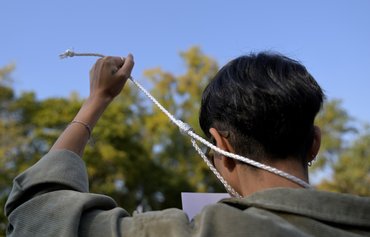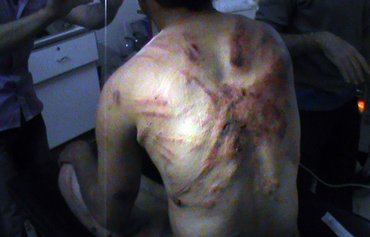Iranian forces repressing widespread protests have unlawfully killed, tortured, sexually assaulted and disappeared children as part of a pattern of serious violations, Human Rights Watch (HRW) said in a Tuesday (April 25) report.
The report addresses the latest state of human rights in Iran, focusing on the brutal and unlawful treatment of minors in the country.
"Iranian authorities have also arrested, interrogated and prosecuted children in violation of legal safeguards, and judges have barred children's families from hiring lawyers of their choice to defend them," the report said.
Children have been convicted on vague charges, it added, and have not faced trial in the youth courts that have sole jurisdiction over children's cases, it said.
![Two of the children killed by Iranian security forces during the recent protests. [Fars News]](/cnmi_am/images/2023/04/26/41850-Iran-children-protests-600_384.jpg)
Two of the children killed by Iranian security forces during the recent protests. [Fars News]
![An Iranian woman holds up a sign saying 'Mandatory hair covering is like cutting women's head off!' at a recent protest in Iran. [Iran International]](/cnmi_am/images/2023/04/26/41852-Iran-protests-crackdown-600_384.jpg)
An Iranian woman holds up a sign saying 'Mandatory hair covering is like cutting women's head off!' at a recent protest in Iran. [Iran International]
"Security forces have arrested and detained children without notifying their families, sometimes for weeks," the rights group said.
"Students released from detention have been barred from returning to school, or authorities have cut off their families' social welfare, resulting in the children having to go to work."
HRW said it has documented violence that has included "restraining, blindfolding, and torturing children in detention", including the sexual assault of a 17-year-old boy.
"A high school student said that security forces pushed her onto a lit gas range during arrest, setting her clothing on fire, and beat and whipped her during interrogation," HRW said.
"Interrogators tortured another boy by shoving needles under his nails," it said.
Two children were tortured to provide the whereabouts of family members, it said, and a 16-year-old tried twice to take his own life "after being beaten, electroshocked, and sexually assaulted".
The authorities have failed to provide medical treatment to children the forces injured, including a 13-year-old boy whose rib was broken during a beating, HRW said, and family members have been told to keep quiet about the abuses.
Crushing country's youth
The ongoing protests are the most serious in Iran since the November 2019 unrest over fuel price rises, marked this time by the presence of large numbers of women.
The September death of 22-year-old Mahsa Amini in custody of the so-called "morality police" ignited the widespread protests.
There have been rallies across the country for months, during which demonstrators have blockaded streets, hurled stones at security forces, set fire to police vehicles and garbage bins, and chanted anti-government slogans.
Many women have removed their headscarves in defiance of the Islamic Republic's strict laws. Some have set their headscarves on fire or symbolically cut their hair.
The protests were met with the regime's brutal suppression and crackdown.
A large part of the regime's crackdown has been focused on minors, who have been one of the main forces behind the protests.
By early April, Iranian rights groups had recorded the killings of 537 protesters by security forces, including at least 68 children, per HRW.
"Children who have experienced horrific abuses in detention and at trial risk long-lasting harm," said HRW associate children's rights director Bill Van Esveld.
"The United Nations Fact Finding Mission should prioritise investigating these abuses and recommend a path to accountability," he said.
On March 23, Amnesty International reported that Iran's intelligence and security forces have subjected child protesters to torture, beatings, flogging, electric shocks, rape and other sexual violence.
Some were as young as 12.
"Iranian state agents have torn children away from their families and subjected them to unfathomable cruelties," said Diana Eltahawy, Amnesty International's deputy regional director for the Middle East and North Africa.
"It is abhorrent that officials have wielded such power in a criminal manner over vulnerable and frightened children, inflicting severe pain and anguish upon them and their families and leaving them with severe physical and mental scars."
"This violence against children exposes a deliberate strategy to crush the vibrant spirit of the country's youth and stop them from demanding freedom and human rights," she said.
Chain school poisonings
In recent months, there have been hundreds of incidents of poisoning targeting female students -- mostly elementary school students -- in Iran.
The cause of most of these incidents, known as "chain school poisonings", which are understood to be deliberate, has been a "smellable substance", Iran's Health Ministry has said.
Some observers say ultra-hardline individuals or groups may be responsible for the poisonings as they have objections to girls' education.
Their ire may have been triggered by protests over women's hair covering, they say.
But the details of the poisonings, which have alarmed families and landed dozens of girls in urgent care with breathing problems, remain murky.
On March 6, Iranian leader Ali Khamenei called for an investigation into the incidents and pledged to punish those responsible to the highest degree.
The government has yet to name any possible perpetrators.
Meanwhile, the poisonings have continued, leaving many girls afraid to attend school, and many parents fearful of sending them.
"I'd rather my daughter be safe than studious," a 45-year-old Iranian mother told Al-Mashareq, explaining her decision to keep her daughter out of school.
Even if the regime has no part in the poisonings, Iranians told Al-Mashareq, the incidents are yet another sign of its negligence.

![A number of minors killed during Iran's recent protests. [Twitter via Amnesty International]](/cnmi_am/images/2023/04/26/41851-Iran-minors-killed-600_384.jpg)






